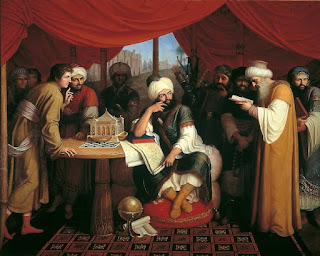His full name was Abu Ja'far Harun ibn Muhammad al-Mahdi, but was usually shortened. The "al-Rashid" epithet means "the just" or "the upright." As a very young man, he was nominally in charge of several expeditions against the Byzantine Empire (older generals probably made the decisions), but was given credit, and named governor of Armenia, Azerbaijan, Egypt, Syria, and Tunisia. He left the day-to-day administration of these to his tutor, Ja'far ibn Yahya.
His father, al-Mahdi, died in 785, and his older brother al-Hadi died of unknown causes in 786, making Harun a young caliph. He made Ja'far ibn Yahya his vizier. Ja'far was of the powerful Iranian Barmakid family, and brought in many Barmakids to administer the kingdom.
Harun was a great supporter of art and culture. His father had founded Baghdad, and Harun probably founded the extensive library called the House of Wisdom. He also was more tolerant of previous dissenters, releasing from captivity many of the Umayyads imprisoned by his brother when the Abbasids took over.
He also fostered relations with the west. An embassy from the court of Charlemagne came in 799 to Baghdad to open friendly relations. Harun sent gifts to Charlemagne, including a clock that had different animated figurines and chimes at the hours, which Charlemagne thought magical. He also sent an elephant.
Like Charlemagne (and Arthur), Harun's reputation took on a legendary status and he entered into the literature and culture as a figure in many stories. He appears in a score of tales from the 1001 Nights, including The Three Apples and the Tale of Núr al-Dín Alí and His Son Badr.
Harun did make a few strategic errors. He allowed local administrators of the countries under him to exercise more autonomy than was usual in exchange for large annual payments to the caliph. This enriched Harun's coffers, allowing him to make great advances in supporting art and culture, but de-centralized the power, making the caliph's position weaker. Also, he divided the kingdom between his two sons, who fought each other once Harun was dead.
While he was alive, though, he accomplished great things for his people, one of which was the aforementioned House of Wisdom. Let's see what that was all about next time.

